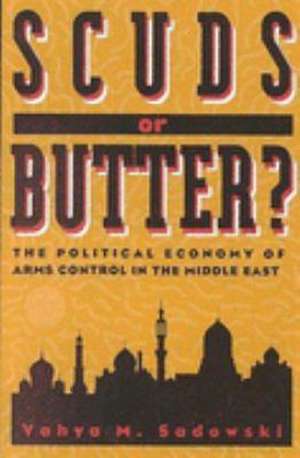Scuds or Butter?: The Political Economy of Arms Control in the Middle East
Autor Yahya M. Sadowskien Limba Engleză Paperback – 1993
In the late 1970s and 1980s, Middle Eastern states spent more than $600 billion expanding their military forces. They acquired thousands of tanks, advanced fighter aircraft, ballistic missiles, chemical weapons, and—in some cases—nuclear devices. These potent arsenals make the Middle East the tinderbox of world affairs.
In this book, foreign policy analyst Yahya Sadowski shows that the arms race cannot be sustained in the 1990s. Declining oil prices, overpopulation, economic mismanagement, and foreign policy adventures—such as the 1992 Gulf War, which cost local states another $600 billion—have sapped the economies of the Middle East. Facing dwindling incomes and rising expenses, growing numbers of Middle Easterners now favor diverting funds away from military expenditures and concentrating them on economic development programs.
Sadowski argues that arms control programs for the Middle East should be designed to reinforce and exploit these economic pressures for demilitarization. He examines the strengths and weaknesses of various arms control proposals, such as the U.S. call for a cartel of weapons exporters and a Jordanian plan to liquidate the foreign debt of states that curb military expenditures.
In this book, foreign policy analyst Yahya Sadowski shows that the arms race cannot be sustained in the 1990s. Declining oil prices, overpopulation, economic mismanagement, and foreign policy adventures—such as the 1992 Gulf War, which cost local states another $600 billion—have sapped the economies of the Middle East. Facing dwindling incomes and rising expenses, growing numbers of Middle Easterners now favor diverting funds away from military expenditures and concentrating them on economic development programs.
Sadowski argues that arms control programs for the Middle East should be designed to reinforce and exploit these economic pressures for demilitarization. He examines the strengths and weaknesses of various arms control proposals, such as the U.S. call for a cartel of weapons exporters and a Jordanian plan to liquidate the foreign debt of states that curb military expenditures.
Preț: 155.09 lei
Nou
Puncte Express: 233
Preț estimativ în valută:
29.68€ • 30.80$ • 24.81£
29.68€ • 30.80$ • 24.81£
Carte tipărită la comandă
Livrare economică 17-31 martie
Preluare comenzi: 021 569.72.76
Specificații
ISBN-13: 9780815776635
ISBN-10: 0815776632
Pagini: 112
Dimensiuni: 152 x 229 x 10 mm
Greutate: 0.18 kg
Ediția:New.
Editura: Brookings Institution Press
Colecția Brookings Institution Press
Locul publicării:United States
ISBN-10: 0815776632
Pagini: 112
Dimensiuni: 152 x 229 x 10 mm
Greutate: 0.18 kg
Ediția:New.
Editura: Brookings Institution Press
Colecția Brookings Institution Press
Locul publicării:United States
Notă biografică
Yahya M. Sadowski is a senior fellow in the Foreign Policy Studies program at the Brookings Institution and the author of Political Vegetables? Businessman and Bureaucrat in the Development of Egyptian Agriculture (Brookings, 1991).
Descriere
In the late 1970s and 1980s, Middle Eastern states spent more than $600 billion expanding their military forces. They acquired thousands of tanks, advanced fighter aircraft, ballistic missiles, chemical weapons, and—in some cases—nuclear devices. These potent arsenals make the Middle East the tinderbox of world affairs.
In this book, foreign policy analyst Yahya Sadowski shows that the arms race cannot be sustained in the 1990s. Declining oil prices, overpopulation, economic mismanagement, and foreign policy adventures—such as the 1992 Gulf War, which cost local states another $600 billion—have sapped the economies of the Middle East. Facing dwindling incomes and rising expenses, growing numbers of Middle Easterners now favor diverting funds away from military expenditures and concentrating them on economic development programs.
Sadowski argues that arms control programs for the Middle East should be designed to reinforce and exploit these economic pressures for demilitarization. He examines the strengths and weaknesses of various arms control proposals, such as the U.S. call for a cartel of weapons exporters and a Jordanian plan to liquidate the foreign debt of states that curb military expenditures.
In this book, foreign policy analyst Yahya Sadowski shows that the arms race cannot be sustained in the 1990s. Declining oil prices, overpopulation, economic mismanagement, and foreign policy adventures—such as the 1992 Gulf War, which cost local states another $600 billion—have sapped the economies of the Middle East. Facing dwindling incomes and rising expenses, growing numbers of Middle Easterners now favor diverting funds away from military expenditures and concentrating them on economic development programs.
Sadowski argues that arms control programs for the Middle East should be designed to reinforce and exploit these economic pressures for demilitarization. He examines the strengths and weaknesses of various arms control proposals, such as the U.S. call for a cartel of weapons exporters and a Jordanian plan to liquidate the foreign debt of states that curb military expenditures.
